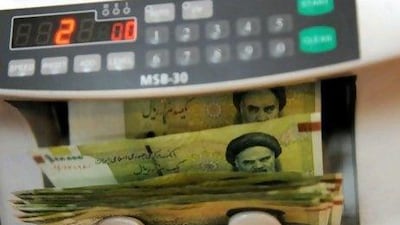Traders in Dubai are owed more than Dh1 billion (US$272.2 million) as the slide in Iran's currency means buyers from the country are unable to pay for goods.
Under pressure from global sanctions, the Iranian rial has fallen by about half against the dirham in black-market trading in the past four months. The depreciation is pushing up the cost of goods flowing from the Emirates to Iran.
Many exports work on a credit agreement, so shipments are dispatched with the buyer promising to pay on an agreed date in the months ahead.
The sharp devaluation in the currency has followed toughened trade sanctions from the United States, the United Nations and most recently the EU. It now costs 19,000 rials to buy $1.
This has left buyers in Iran unable to pay.
Mohammad Redha Kamali Al Awazi General Trading, based near the Spice Souq in Deira, has been exporting Chinese-made silver tea trays to Iran for years. Historically, that trade has accounted for about 25 per cent of the family firm's business.
But the business is owed "hundreds of thousands" of dirhams for goods.
"It's a waiting game," said Masood Al Awadhi, who works for the business. "Many of these people have been our customers for decades, and we have faith they will eventually pay."
The business is redirecting some tray exports to Libya, Iraq and Pakistan. But some of the trays - decorated with gold images of Persian kings - are sold only to the Iranian market. They have been collecting dust in the shop for almost six months.
Traders are still able to export to Iran as long as the goods are not banned by global sanctions. These commonly ban the export of nuclear, missile and certain military products to Iran. More recently, exports of oil, equipment for the energy industry and precious metals have been covered by measures agreed by the EU. But financing any trade with Iran has become harder as a growing number of banks stop funding any deals with Iran in response to sanctions agreed by the US, UK and Canada seeking to squeeze Iran's financial system.
As a result, traders have been forced to rely on cash deals or informal credit arrangements. Iran's central bank even authorised the use of gold recently for settling payments because of the dwindling value of the rial.
Many Dubai businesses are facing a similar problem, said Morteza Masoumzadeh, a member of the executive committee of the Iranian Business Council in the emirate.
He estimates Dubai traders are owed more than Dh1bn by Iranian buyers. "There's no way for them to pay and it's hurting Dubai traders," he said.
As a result, many traders are scaling back business with the country until the currency strengthens enough for them to be paid back.
For years, Dubai has served as a gateway for the onward passage to Iran of a wide range of goods including grainand cars. The trade accounts for about 7 per cent of the UAE's GDP, estimates Capital Economics.
But officials have recently expressed concern that the flow of trade may slow.
Iran Insurance, a Dubai insurer of export credit for trade with Iran, has suffered a 10 to 15 per cent slump in demand from businesses looking to ship to Iran, said Ali Sowdagar, a marketing representative of the insurer.
"Most of them have stopped unless the customer is willing to pay cash. Otherwise they are not," he said.
The increasingly tough sanctions and a deteriorating economy have pushed the rial into free fall in recent months.
"The shortage of foreign exchange reserves as a result of the oil embargo has sent Iranians rushing to buy US dollars or put their money in gold or property," said Ayesha Sabavala, a Middle East analyst at the Economist Intelligence Unit. "This is releasing a flood of Iranian rials into the market and depreciating the rate."
The currency's fall is the latest headache Dubai traders doing business with Iran have faced. Many are already grappling with the challenge posed by a growing stream of banks in the UAE refusing to provide letters of credit or other finance to pay for shipments.
Abdulla Ahmed Al Awazi General Trading has rerouted its shipments to other markets such as Russia and other former Soviet countries.
"We have tried to be careful and trade not as freely as before as we don't want to create a problem for the buyers and have to think about our business," said Ardelan Zamin Peyma, the brand manager of the firm.
twitter: Follow our breaking business news and retweet to your followers. Follow us

